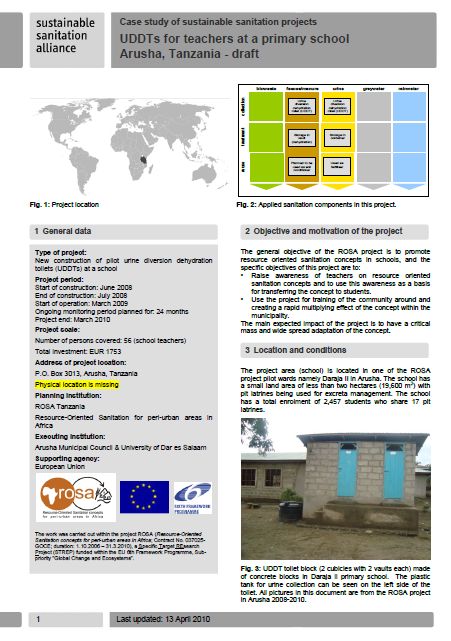UDDTs for teachers at a primary school Arusha, Tanzania - Case study of sustainable sanitation projects
Senzia, M. (2011)

Published in: 2011
Publisher:
Sustainable Sanitation Alliance (SuSanA)
Author:
Senzia, M.
Uploaded by:
SuSanA secretariat
Partner profile:
common upload
11337 Views
160 Downloads
Location of library entry
Content - Summary
This case study is about a pilot sanitation facilities at a school compound in Arusha, Tanzania. UDDTs were constructed to serve a population of 56 people. This project was part of the larger EU-funded ROSA project.
The general objective of the ROSA project is to promote resource oriented sanitation concepts in schools, and the specific objectives of this project are to:
• Raise awareness of teachers on resource oriented sanitation concepts and to use this awareness as a basis for transferring the concept to students.
• Use the project for training of the community around and creating a rapid multiplying effect of the concept within the municipality.
The main expected impact of the project is to have a critical mass and wide spread adaptation of the concept.
There was a delay between the end of construction and commissioning of the new toilets due to some government protocol in commissioning of various projects. The school management wanted to make the occasion very official and to be done during independent torch day which made the whole
process very much delayed. To date, the operation and maintenance of the UDDTs in Daraja II primary school has been left to the school management after receiving minimum training on how to use the toilet and reuse the UDDT products.
The headmaster has appointed one of the teachers (Ms Happiness) to be responsible for day-to-day maintenance of the toilet. She has to make sure that ashes and toilet papers are available and that general cleaning is done properly. The cleaning is done by students as part of their extracurricular (outside class) works as per school regulations.
There have been some problems in operating the UDDTs due to urine pipe blockage which has been experienced once. ROSA project staff was called to unblock the system (Fig. 7). The blockage occurred because some users poured ash into the urine compartment instead of the faeces hole. ROSA staff was called to unblock it because the school was still learning
and some of the staff needed to learn as well since they were not following the required procedure.
With respect to the longer term impacts of the project: The project concentrated in only three wards of Arusha: Daraja II, Lemara and Sokon I. The uptake of UDDTs has not been very good because of financial constraints. The private sector is not really enabled to get loans from banks due to lack of guarantees.
Bibliographic information
Senzia, M. (2011). UDDTs for teachers at a primary school Arusha, Tanzania - Case study of sustainable sanitation projects. Sustainable Sanitation Alliance (SuSanA)
Filter tags
Case studies in SuSanA template English Peri-urban Schools Sub-Saharan Africa Urine diversion dehydration toilets (UDDTs)














